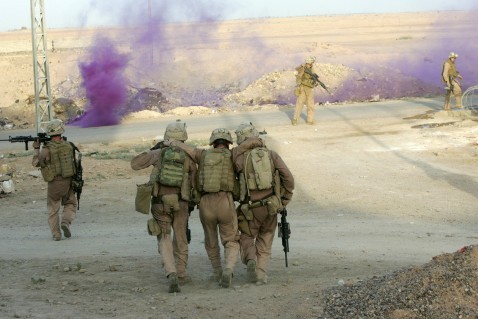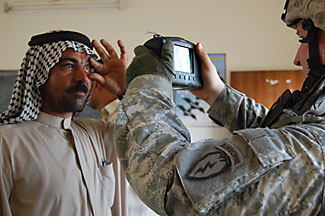Depressing Report from Afghanistan
BY Herschel SmithFrom the comments section in An Open Letter to Milbloggers, journalist Ben Shaw gives us this very depressing perspective from Afghanistan.
As a journalist (and combat veteran) currently embedded with US forces in Afghanistan, I have found that roughly 95% of the troops on the ground in no way believe in their mission, have no confidence that their efforts will bring about lasting change to Afghan security, stability, governance, or a decreased influence of radicalism. In truth, they fight simply to stay alive and want nothing more than to go home. A recent quote:
“I joined to defend and fight for the United States, but now I feel like I’ve been tasked out to fight for Afghanistan. Yet the people don’t even care, and make no effort whatsoever to help us help them. They don’t WANT help.”
The nature of freedom is that those who are unwilling to fight for it personally will never realize it. As it stands, nothing is more important to Afghans than survival, even at the expense of all self-dignity, nationalism, tribalism, and whatever ideals may at one time surpassed the will to simply “get by.”
I have also discovered that if I publicize these findings (that literally 95% of troops don’t believe in their own mission), the Soldiers who I cite will be charged, potentially relieved of command, and I will be asked to disembed from these units.
As a recent example, I filmed approximately 75 minutes of combat footage, knowingly exposed myself to concentrated enemy fire, and learned two days ago that if I post this footage, the Soldiers on film will be charged and/or relieved for uniform violations, improper wear of personal protective equipment (ballistic glasses, fire-retardant gloves, etc), and that low-level commanders have already begun this process. In an attempt to preserve the careers of the Soldiers I am trying to advocate, I am unable to tell (or show) the US public what they’re experiencing and what they think of it. The military only wants good news to flow from embedded journalists – not facts.
The reality is this: the current tactical directive leaves US troops on the ground increasingly vulnerable, often unsupported by air assets or indirect fire, and as a consequence their personal mission is to keep each other alive and come home. Under this current “soft war” policy, the war cannot be won. After all, Pashtun Islamic culture sees any sort of kindness and mercy as a weakness – and immediately exploit it. The Taliban, knowing the restrictive nature of the current ROE/Tactical directive, use it against US forces regularly.
US troops feel abandoned by their chains of command, bilked by military recruiters, and participants in a conflict that history will not treat kindly. They will return to the US and to civilian life full of disappointment, bitterness at their commanders, and unwilling to serve again. And military commanders here are doing their very best to ensure that this never reaches the public. In their pursuit of mission accomplishment, they have altogether neglected their second purpose: troop welfare. The former, however, will never be realized without an equally dedicated concentration on the latter.
I invite comments and criticism at byshaw@gmail.com.
Photos from my current embed can be found online at http://picasaweb.google.com/byshaw
My own website is http://byshaw.com
And then further:
As of today, my photos, videos, and writing have been so closely monitored by the command that I have elected to remove all imagery for fear of jeopardizing the troops on the ground. Commanders are using the images and footage to threaten Article 15s for Soldiers photographed out of uniform, and also threatening to relieve platoon sergeants and first sergeants for allowing such things to happen. Professionally, I have been bound and gagged – that is unless I’m willing to burn an entire troop (or squadron) of Soldiers in the process of telling the US public what’s happening – which would be counterproductive.
My next step will be to file a formal complaint with commanders who use media resources to incriminate their own subordinates. This command, I have determined, is far more concerned with looking pretty than accomplishing their mission. I also think that, somehow, the US public needs to know about it.
The entire report is very depressing for me. I won’t weigh in on the full account, but I’ll address one aspect of it. It really is disgraceful that command, whether NCOs or field grade officers, is spending any time at all trying to push paperwork over PPEs in the field. This is very disappointing for me to read.
Colonel Mullen who commanded 2/6 in Fallujah in 2007, for whom I otherwise have an immense amount of respect (and by the way, so does my son who told me he would follow Colonel Mullen and First Sergeant Dagenhart anywhere on earth and to the gates of hell too), nonetheless disappointed me during the summer of 2007. I suspect that Ben is embedded with the Army, but this focus on unimportant things isn’t just restricted to the Army. The Marines engage in their share of stupidity.
In April of 2007 the men from 2/6 left their Marine Corps issued sand/desert boots behind in the Barracks (clodhoppers they were, with heavy Vibram soles) and purchased more user-friendly, ligher, more comfortable boots (which looked about the same) from Tactical Applications Group, TAGs, just outside of Camp Lejeune. Slab with OPFOR knows where I am talking about. They also ditched the IBA (Interceptor Body Armor) outer shell (or tactical carrier), and opted for the Spartan II also at TAGs (the civilian version of the Modular Tactical Vest which had not yet been issued, but the Spartan II was also better than the MTV).
Along comes MARADMINs, and the men had to throw away all of the boots they purchased from TAGs (while actually deployed in Fallujah) and use the heavier MC issued boots that had to be sent later, creating logistical problems that didn’t otherwise have to exist. On the bright side, they all looked the same. Yes, they all looked the same. At least they got to keep their Spartan II carriers.
Next, as I was writing Operation Alljah, I linked this photograph taken by a stringer in Fallujah.
To which Colonel Mullen, while giving me his incredibly useful interview, responded that these Marines could not be 2/6. They weren’t wearing the right clothing. To which I responded, “Sir, this is 2/6 Golf Company, 3rd Platoon, and the one being carried in the middle is my son after he sprained his ankle jumping down from the roof of a house while being shot at. He’s bent over because he is taller than they are – I know them. The one on the left is carrying his SAW and providing cover. We found the photo on Yahoo and talked to him about it.” I believe that this is in the industrial district of Fallujah. That particular patrol was over for my son, with light duty for a week or two.
Later my son told me that they would always make sure to wear the right clothing, with sleeves cleanly rolled to just the right length, no matter what the sun was doing to them, when they passed a certain place in Fallujah. This particular place was where a camera was mounted, streaming to the Pentagon. There were enough high powered cameras in the area that he could look at Camp Fallujah from FOB Reaper on the South side of Fallujah and tell if a Marine had not shaved that day.
You know. You want to make sure that you look right and everything. That’s what really matters.





